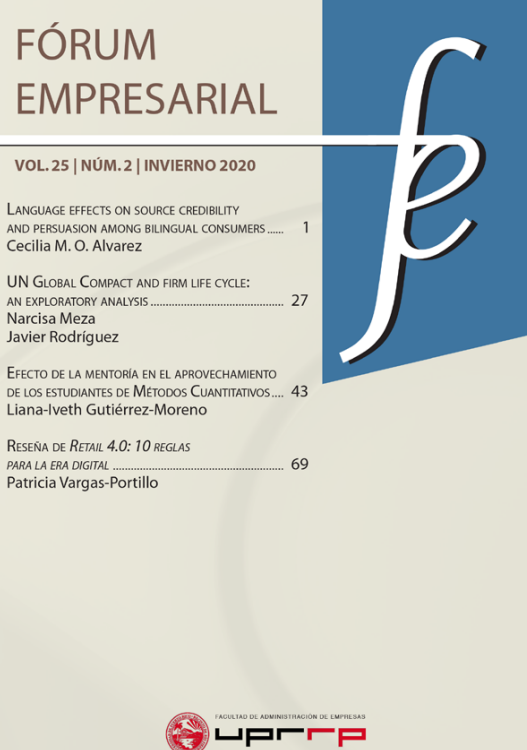Abstract
We study the life cycle stage at which firms decide to join the United Nations Global Compact (UNGC). The UNGC is arguably the most important voluntary corporate social responsibility (CSR) initiative. We follow the life cycle methodology by Dickinson (2011). Our overall results show that most firms in the sample decide to join the UNGC when at the Mature stage of their life cycle. This result is in line with previous studies that show that mature firms invest more in CSR, than firms in other life stages. To the best of our knowledge, this exploratory undertaking is not yet available in the corporate responsibility literature.
References
Anthony, J. H., & Ramesh, K. (1992). Association between accounting performance measures and stock prices: a test of the life cycle hypothesis. Journal of Accounting and Economics, 15(2), 203–227. https://doi.org/10.1016/0165-4101(92)90018-W
Arevalo, J. A., Aravind, D., Ayuso, S., & Roca, M. (2013). The Global Compact: an analysis of the motivations of adoption in the Spanish context. Business Ethics: A European Review, 22(1), 1–15. https://doi.org/10.1111/beer.12005
Barkemeyer, R. (2009). Beyond compliance–below expectations? CSR in the context of international development. Business Ethics: A European Review, 18(3), 273–289. https://doi.org/10.1111/j.1467-8608.2009.01563.x
Barrese, J., Phillips, C., & Shoaf, V. (2020). Why do US public companies continue to join the UN global compact: Ethics or economics? International Studies of Management & Organization, 50(3), 209–231. https://doi.org/10.1080/00208825.2020.1811525
Black, E. L. (1998). Life-cycle impacts on the incremental valuerelevance of earnings and cash flow measures. Journal of Financial Statement Analysis, 4, 40–57.
Blomkvist, M., Löflund, A., & Vyas, H. (2021). Credit ratings and firm life-cycle. Finance Research Letters, 39, 101598. https://doi.org/10.1016/j.frl.2020.101598
Bremer, J. A. (2008). How global is the global compact? Business Ethics: A European Review, 17(3), 227–244. https://doi.org/10.1111/j.1467-8608.2008.00533.x
DeAngelo, H., DeAngelo, L., & Stulz, R. M. (2006). Dividend policy and the earned/contributed capital mix: a test of the lifecycle theory. Journal of Financial Economics 81(2), 227–254. https://doi.org/10.1016/j.jfineco.2005.07.005
DeAngelo, H., DeAngelo, L., & Stulz, R. M. (2010). Seasoned equity offerings, market timing, and the corporate lifecycle. Journal of Financial Economics, 95(3), 275–295. https://doi.org/10.1016/j.jfineco.2009.11.002
Dickinson, V. (2011). Cash flow patterns as a proxy for firm life cycle. The Accounting Review, 86(6), 1969–1994. https://doi.org/10.2308/accr-10130
Garayar Erro, A., & Calvo Sánchez, J. A. (2012). Joining the UN global compact in Spain: an institutional approach. Revista de Contabilidad, 15(2), 311–355. https://doi.org/10.1016/S1138-4891(12)70047-X
Gort, M., & Klepper, S. (1982). Time paths in the diffusion of product innovations. The Economic Journal, 92(367), 630-653. https://doi.org/10.2307/2232554
Grullon, G., Michaely, R., & Swaminathan, B. (2002). Are dividend changes a sign of firm maturity? The Journal of Business, 75(3), 387–424. https://doi.org/10.1086/339889
Hasan, M. M. (2018). Organization capital and firm life cycle. Journal of Corporate Finance, 48, 556-578. https://doi.org/10.1016/j.jcorpfin.2017.12.003
Hasan, M. M., & Habib, A. (2017). Corporate life cycle, organizational financial resources and corporate social responsibility. Journal of Contemporary Accounting & Economics, 13(1), 20–36. https://doi.org/10.1016/j.jcae.2017.01.002
Janney, J. J., Dess, G., & Forlani, V. (2009). Glass houses? Market reactions to firms joining the UN global compact. Journal of Business Ethics, 90, Article 407. https://doi.org/10.1007/s10551-009-0052-x
Jastram, S. M., & Klingenberg, J. (2018). Assessing the outcome effectiveness of multi-stakeholder initiatives in the field of corporate social responsibility–The example of the United Nations Global Compact. Journal of Cleaner Production, 189, 775–784. https://doi.org/10.1016/j.jclepro.2018.04.005
Kell, G. (2013). 12 Years later: reflections on the growth of the UN Global Compact. Business and Society, 52(1), 31–52. https://doi.org/10.1177%2F0007650312460466
Lim, A., & Tsutsui, K. (2012). Globalization and commitment in corporate social responsibility: cross-national analyses of institutional and political-economy effects. American Sociological Review, 77(1), 69–98. https://doi.org/10.1177%2F0003122411432701
Livnat, J., & Zarowin, P. (1990). The incremental information content of cash-flow components. Journal of Accounting and Economics, 13(1), 25-46. https://doi.org/10.1016/01654101(90)90066-D
Lopatta, K., Kaspereit, T., & Gastone, L. M. (2020). Managerial style in cost asymmetry and shareholder value. Managerial and Decision Economics, 41(5), 800–826. https://doi.org/10.1002/mde.3139
Meza, N., Báez, A., Rodriguez, J., & Toledo, W. (2020). The dividend signaling hypothesis and the corporate life cycle. Managerial Finance, 46(12), 1569-1587.https://doi.org/10.1108/MF-10-2019-0512
Ortas, E., Álvarez, I., & Garayar, A. (2015). The environmental, social, governance, and financial performance effects on companies that adopt the United Nations Global Compact. Sustainability, 7(2), 1932–1956. https://doi.org/10.3390/su7021932
Orzes, G., Moretto, A. M., Ebrahimpour, M., Sartor, M., Moro, M., & Rossi, M. (2018). United Nations Global Compact: literature review and theory-based research agenda. Journal of Cleaner Production, 177, 633–654. https://doi.org/10.1016/j.jclepro.2017.12.230
Rasche, A., Waddock, S., & McIntosh, M. (2013). The United Nations global compact: retrospect and prospect. Business & Society, 52(1), 6–30. https://doi.org/10.1177%2F0007650312459999
Schembera, S. (2018). Implementing corporate social responsibility: empirical insights on the impact of the UN Global Compact on its business participants. Business & Society, 57(5), 783–825. https://doi.org/10.1177%2F0007650316635579
Sethi, S. P., & Schepers, D. H. (2014). United Nations global compact: the promise–performance gap. Journal of Business Ethics, 122(2), 193–208. https://doi.org/10.1007/s10551-013-1629-y
Thérien, J. P., & Pouliot, V. (2006). The global compact: shifting the politics of international development? Global Governance: A Review of Multilateralism and International Organizations, 12(1), 55–75. https://doi.org/10.1163/19426720-01201006
Trihermanto, F., & Nainggolan, Y. A. (2018). Corporate life cycle, CSR, and dividend policy: empirical evidence of Indonesian listed firms. Social Responsibility Journal, 16(2), 159–178. https://doi.org/10.1108/SRJ-09-2017-0186
Waddock, S. (2004). Creating corporate accountability: foundational principles to make corporate citizenship real. Journal of Business Ethics, 50(4), 313–327.
Williams, O. F. (2014). The United Nations global compact: what did it promise? Journal of Business Ethics, 122(2), 241–251. https://doi.org/10.1023/B:BUSI.0000025080.77652.a3

This work is licensed under a Creative Commons Attribution-NonCommercial-ShareAlike 4.0 International License.
Copyright (c) 2020 Fórum Empresarial

